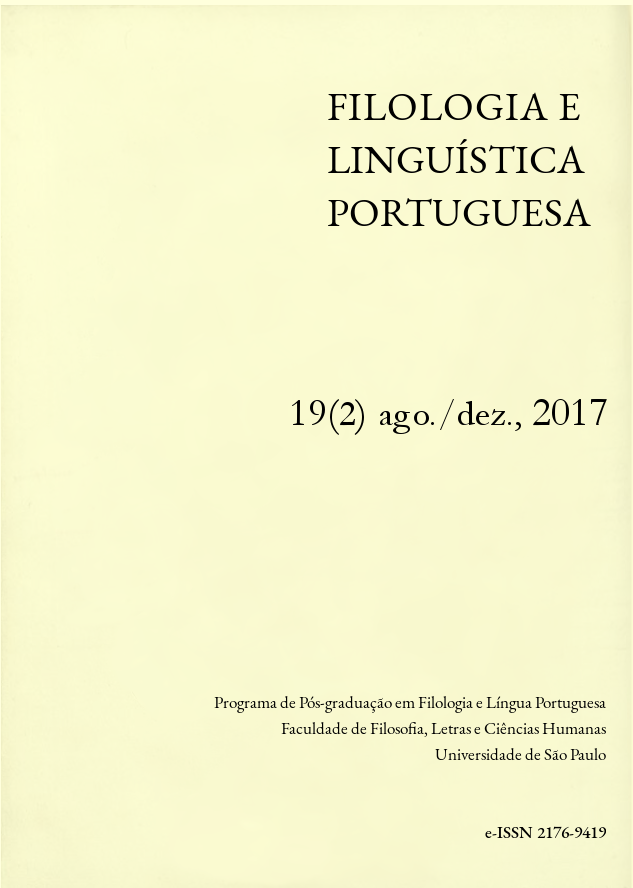As orações sem sujeito e a Estrutura da Proposição
DOI:
https://doi.org/10.11606/issn.2176-9419.v19i2p271-283Palavras-chave:
Orações sem sujeito. Posição sujeito. Princípio de projeção estendido. Locativo nulo.Resumo
Analisa-se o problema das chamadas orações sem sujeito que afrontam a definição clássica da proposição a qual prevê a estrutura sujeito-predicado. Comentamos os pressupostos e as implicações da análise tradicional de Said Ali (1950) bem como a análise gerativista sobre esse tema. De acordo com este quadro teórico, uma condição formal, a saber, a categoria T (tense), núcleo da sentença, que dispõe de um traço-D (D-feature), por meio do qual é tratado o princípio de projeção estendido (EPP), exige que a posição do sujeito seja, invariavelmente, ocupada por um constituinte, o qual poderá ser ou não realizado fonologicamente e interpretado ou não tematicamente (Chomsky, 1995; Shim, 2001). Entretanto, a solução gerativista é exclusivamente formal e não resolve o problema da ocorrência de um constituinte funcionando como predicado, mas que não é, nos termos de Frege, saturado, ou seja, não predica, de fato, nenhum constituinte. Considerando que, nas orações sem sujeito que se referem ao tempo e que são existenciais, está subjacente, de forma inerente, que tais enunciados dizem respeito ao que existe ou ao tempo que faz num lugar tomado de forma genérica ou num lugar específico indeterminado, aventamos a hipótese de que, nesses enunciados, é por meio de um tipo de juízo analítico, que extrai do predicado, utilizando-se uma operação semântica, um locativo nulo, ou não pronunciado, que se obtém um constituinte que termina por funcionar como o sujeito dessas orações no sentido de sujeito lógico ou psicológico como proposto por Paul (1970[1880]).
Downloads
Referências
Angioni L. Introdução à teoria da predicação em Aristóteles. Campinas: Editora da Unicamp; 2006
Avelar J, Galves C. Tópico e concordância em português brasileiro e português europeu. Textos selecionados – XXVI Encontro da Associação Portuguesa de Linguística. Lisboa: APL; 2011. p. 69-45.
Bertrand J. Nouvelle Grammaire grecque. Paris: Ellipses; 2000.
Bonnet C; Wagner P. L’Âge d’or de l’empirisme logique. Paris: Gallimard; 2006.
Botter B. Lógica I: Guia de estudos. Lavras: UFLA; 2012.
Bouveresse J. Schlick et le synthétique a priori. In: Nef F, Vernant D. Le Formalisme en Question. Le tournant des années 30. Paris: Vrin; 1998. p.215-243.
Carnap R. Significado e sinonímia nas linguagens naturais. In: Schlick M, Carnap R. Coletânea de Textos. Os Pensadores. São Paulo: Abril Cultural; 1985. p.130-142.
Castro S de. Três formulações do objeto da metafísica de Aristóteles. Rio de Janeiro: Contraponto; 2008.
Chomsky N. The minimalist program. Cambridge Mass.: The MIT Press; 1995.
Duarte ME. A evolução da representação do sujeito pronominal em dois tempos. In: Paiva MC, Duarte ME. Mudança linguística em tempo real. Rio de Janeiro: Contra Capa; 2003. p.115-128.
Frege FLG. Função e conceito. Trad. Paulo Alcoforado. In: Alcoforado P, organizador. Lógica e filosofia da linguagem. São Paulo: Editora da Universidade de São Paulo; 2009.
Hauy A. Da necessidade de uma gramática padrão da língua portuguesa. São Paulo: Ática; 1986.
Höffe O. Immanuel Kant. São Paulo: Martins Fontes; 2005.
Ildefonse F. La naissance de la grammaire dans l’antiquité grecque. Paris: Vrin; 1997.
Kant I. Critique de la raison pure. Paris: Gallimard; 1980. [1a ed. 1781].
Liddel H, Scott R, Jones HS. A Greek-English lexicon. Oxford: Oxford University Press; 1990.
Olivier M. Quine. Paris: Les Belles Lettres; 2015.
Paul H. Princípios fundamentais da história da língua. Tradução de Maria Luisa Schemann. Lisboa: Fundação Calouste Gulbenkian; 1970. [1a ed. 1880].
Pfänder A. Lógica. Buenos Aires: Espasa Calpe; 1945.
Platão. O sofista. Diálogos. Coleção Os pensadores. São Paulo: Abril Cultural; 1983.
Pontes E. O tópico no português do Brasil. Campinas: Pontes; 1987.
Quine W. From a logical point of view. Harvard: Harvard University Press; 1953.
Rizzi L. Issues in Italian syntax. Dordrecht: Foris; 1982.
Rosier I. Roger Bacon et le problème du sujet sous-entendu. Histoire Epistémologie Langage 1983;5(1):31-39.
Said Ali M. Dificuldades da língua portuguesa. Rio de Janeiro: Livraria Acadêmica; 1950.
Shim J-Y. On the satisfation of the EPP in the minimalist program. [tese]. Sogang University; 2001.
Downloads
Publicado
Edição
Seção
Licença
Os direitos autorais serão cedidos à revista para publicação on-line, com livre acesso e impressa para arquivo em papel. Serão preservados, porém, para autores que queiram republicar os seus trabalhos em coletâneas.





















